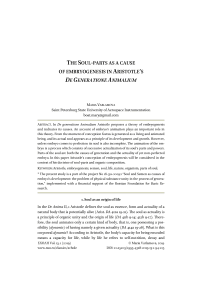The soul-parts as a cause of embryogenesis in Aristotle's De generatione animalium
Автор: Varlamova Maria
Журнал: Schole. Философское антиковедение и классическая традиция @classics-nsu-schole
Рубрика: Статьи
Статья в выпуске: 1 т.13, 2019 года.
Бесплатный доступ
In De generatione Animalium Aristotle proposes a theory of embryogenesis and indicates its causes. An account of embryo’s animation plays an important role in this theory. From the moment of conception foetus is generated as a living and animated being, and its actual soul appears as a principle of its development and growth. However, unless embryo comes to perfection its soul is also incomplete. The animation of the embryo is a process, which consists of successive actualization of its soul’s parts and powers. Parts of the soul are both the causes of generation and the actuality of yet non-perfected embryo. In this paper Aristotle’s conception of embryogenesis will be considered in the context of his doctrine of soul-parts and organic composition.
Aristotle, embryogenesis, semen, soul, life, nature, organism, parts of soul
Короткий адрес: https://sciup.org/147215821
IDR: 147215821 | DOI: 10.25205/1995-4328-2019-13-1-94-105
Список литературы The soul-parts as a cause of embryogenesis in Aristotle's De generatione animalium
- https://nsu.ru/classics/schole/13/13-1-varlam.pdf
- Bos, A.P. (2000) "Why the Soul Needs an Instrumental Body According to Aris-totle", Hermes, 128.1, 20-31.
- Bos, A.P. (2009) "Aristotle on Soul and Soul "Parts" in Semen (GA 2.1, 735a4-22)", Mnemosyne 62, 378-400.
- Code, A. (1987) "Soul as Efficient Cause in Aristotle's Embryology", Philosophi-cal topics 15.2, 51-59
- Cooper, J. M. (1988) "Metaphysics in Aristotle's embryology", Proceedings of the Cambridge philosophical society, vol. 34, 14-41.
- Darovskikh, A. (2017) "The Power of Semen: Aristotle and some Galen's Falla-cies", ΣΗΟΛΗ (Schole) 11.1, 95-116.
- Diels, H., ed. (1882) Simplicii in Aristotelis physicorum libros quattuar priores commentaria. CAG IX. Berlin.
- Drosaart Lulofs, H.J., ed. (1965) Aristotelis de generatione animalium. Oxford: Clarendon Press.
- Foellinger, S. (2010) "Das Problem des Lebens in Aristoteles' Embryologie", S. Foellinger, ed., Was ist Leben. Aristoteles' Anschauungen zur Entstehung und Funktionsweise von Leben. Stuttgart: Franz Steiner Verlag, 225-238.
- Gotthelf, A. (1987) "Aristotle's Conception of Final Causality", A. Gotthelf, J.G. Lennox, eds., Philosophical Issues in Aristotle's Biology, Cambridge: Cambridge University Press, 204-242.
- Henry, D. (2005) "Embryological Models in Ancient Philosophy", Phronesis 50.1, 1-42.
- Henry, D. (2006) "Understanding Aristotle's Reproductive Hylomorphism", Apeiron 39, 257-88.
- Jaeger, W., ed. (1957) Aristotelis Metaphysica. Oxford: Oxford University Press.
- Johansen, K. T. (2012) The Powers of Aristotle’s Soul. Oxford: Oxford University Press.
- Johnston, R. (2011) "Aristotle's De Anima. On Why the Soul is Not a Set of Capac-ities", British Journal for the History of Philosophy, 19.2, 185-200.
- Matthen, M. (2007) "The four causes in Aristotle's Embryology", Apeiron 22, 159-179.
- Louis, P. (1956) Aristote. Les parties des animaux. Paris: Les Belles Lettres.
- Peck, A.L., trans. (1943) Aristotle. Generation of Animals. Harvard University Press.
- Preus, A. (1977) "Galen's Criticism of Aristotle's Conception Theory", Journal of the History of Biology, 10.1, 65-85.
- Quarantotto, D. (2010) "Aristotle on the Soul as Principle of Biological Unity". S. Foellinger, ed., Was ist Leben. Aristoteles' Anschauungen zur Entstehung und Funktionsweise von Leben. Stuttgart: Franz Steiner Verlag, 35-54.
- Ross, W.D., ed. (1950), Aristotelis Physica. Oxford: Oxford University Press.
- Ross, W.D., ed. (1956) Aristotelis de Anima. Oxford: Oxford University Press.
- Sorabji, R. (1974) "Body and Soul in Aristotle", Philosophy 49.187, 63-89.
- Whiting, J. (1995) "Living Bodies", A. Rorty and M. Nussbaum, eds., Essays on Aristotle's De Anima. Oxford: Oxford University Press, 2nd ed., 78-95.
- Wilberding, J. (2017) Forms, Souls and Embryos. Neoplatonists on Human Re-production. Routledge: London / New York.


